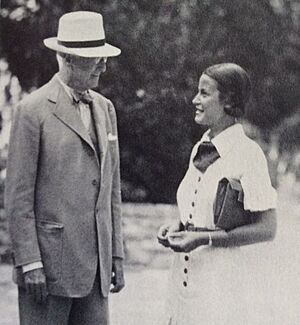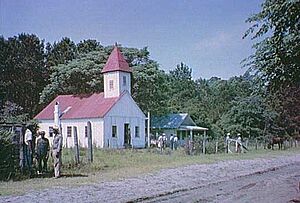Bernard Baruch facts for kids
Quick facts for kids
Bernard Baruch
|
|
|---|---|
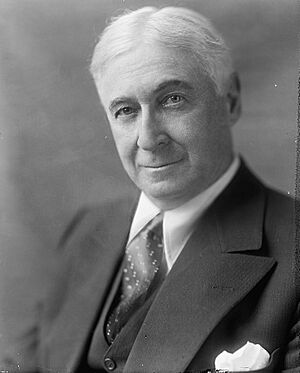 |
|
| Born |
Bernard Mannes Baruch
August 19, 1870 Camden, South Carolina, U.S.
|
| Died | June 20, 1965 (aged 94) New York City, U.S.
|
| Alma mater | City College of New York (BA) |
| Occupation |
|
| Spouse(s) | Annie Griffin |
| Children | 3, including Belle W. |
| Parent(s) |
|
| Honors | Bernard Baruch Handicap at Saratoga Race Course |
| Signature | |
Bernard Mannes Baruch (August 19, 1870 – June 20, 1965) was an American businessman and important government advisor. He became very wealthy by investing in the New York Stock Exchange.
He made a big impression on President Woodrow Wilson during World War I. Baruch helped organize how the country's businesses and factories would support the war effort. He also advised President Wilson during the peace talks after the war.
Later, he became a close advisor to President Franklin D. Roosevelt during World War II. Baruch helped speed up the production of important war supplies like tanks and airplanes. He also worked to create programs that helped injured soldiers recover. In 1946, he represented the United States at the United Nations Atomic Energy Commission. He suggested a plan for international control of atomic energy, but it was not accepted by the Soviet Union.
Contents
Early Life and Education
Bernard Baruch was born on August 19, 1870, in Camden, South Carolina. His parents were Belle (née Wolfe) and Simon Baruch, who was a doctor. Bernard was one of four sons.
In 1879, when Bernard was nine years old, his family moved to New York City. He went to school there and later graduated from the City College of New York.
Becoming a Wall Street Success
Baruch started his career as a broker, helping people buy and sell stocks. He soon became a partner in a company called A.A. Housman & Company. With the money he earned, he bought a special membership, called a "seat," on the New York Stock Exchange for $19,000.
He became very rich before he was 30 years old by investing in the sugar market. This market was growing very fast in Hawaii at the time. Baruch also started his own company, the Intercontinental Rubber Company of New York. This company became very important in the rubber market in the U.S.
By 1903, Baruch had his own investment firm. He earned the nickname "The Lone Wolf of Wall Street" because he preferred to work independently. By 1910, he was one of the most famous financiers on Wall Street.
After 1924, Baruch continued to make a lot of money in the stock market. However, he started to think that a big stock market crash was coming. He began selling his stocks in 1927 and 1928. On September 25, 1929, just before the Black Tuesday crash, Baruch refused to join other investors who wanted to try and stop the market from falling. He even advised the famous humorist Will Rogers to sell his stocks. After the crash, Rogers told Baruch, "I did what you told me, and you saved my life."
Advising Presidents and Government
Helping During World War I
In 1916, Bernard Baruch left his work on Wall Street to advise President Woodrow Wilson. He helped Wilson with national defense and plans for peace. In 1918, he became the chairman of a new group called the War Industries Board. Under his leadership, this board successfully managed how the United States used its businesses and factories to support the war effort during World War I.
After the war, in 1919, President Wilson asked Baruch to join his team at the Paris Peace Conference. Baruch did not agree with the large payments that France and Britain wanted Germany to make after the war. He supported Wilson's idea that countries needed to work together in new ways. He also supported the creation of the League of Nations, an organization meant to promote world peace.
For his important work during the war, Baruch received the Army Distinguished Service Medal. This award recognized his excellent service to the U.S. government.
Preparing for Future Conflicts
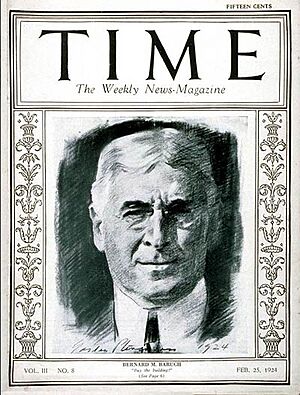
In the 1920s and 1930s, Baruch worried that the United States needed to be ready for another world war. He believed that a stronger version of the War Industries Board was needed. He thought this would help businesses and the military work together better. Baruch remained an important government advisor during this time. He supported President Franklin D. Roosevelt's plans for the country and for dealing with other nations.
World War II Efforts
When the United States entered World War II, President Roosevelt asked Baruch to be a special advisor. Baruch supported a plan that would require people to either work or join the military. He also suggested creating a permanent government agency similar to his old War Industries Board. Baruch believed that business leaders and factory owners should help decide what was needed for the war and who would produce it.
Many of Baruch's ideas were put into action. It is believed that these policies helped cut two years off the time it took to produce important war items like tanks and bombers. This surprised the enemy. During World War II, Baruch remained a trusted advisor to President Roosevelt. In 1944, Roosevelt even spent a month as a guest at Baruch's large estate in South Carolina, called Hobcaw Barony.
In 1944, Baruch helped create a committee of doctors. This committee made recommendations for a new medical field called Physical Medicine and Rehabilitation. Baruch also gave over a million dollars to many medical schools to help this field grow. His father, Simon Baruch, had been a surgeon and taught early physical medicine. That same year, Baruch and Dr. Howard Rusk, an Air Force doctor, advised President Roosevelt to expand programs that helped injured soldiers recover. After the war, these programs were used by the United States Department of Veterans' Affairs.
In 1946, President Harry S. Truman appointed Baruch to represent the United States at the United Nations Atomic Energy Commission. Baruch presented his Baruch Plan on June 14, 1946. This plan suggested that atomic energy, which was very new and powerful, should be controlled by an international group. However, the Soviet Union did not agree with Baruch's plan. They felt it was unfair because the U.S. already had nuclear weapons. They suggested that the U.S. should get rid of its nuclear weapons first. This led to a disagreement, and no plan was agreed upon.
Baruch left the commission in 1947. His influence began to decrease as his ideas became different from those of the Truman administration.
Later Life and Legacy
Baruch was a well-known figure and was often seen walking or sitting in Lafayette Park in Washington, D.C. A popular story says that Baruch liked to sit on a park bench and wait for a signal that the President was ready to see him at the White House. This led to him being called "the Park Bench Statesman."
In 1960, on his ninetieth birthday, a special park bench in Lafayette Park was dedicated to Baruch by the Boy Scouts. There is also a life-size bronze statue of Baruch sitting on a park bench in the lobby of Baruch College in New York City.
He continued to give advice on international matters until he passed away on June 20, 1965, in New York City, at the age of 94. His funeral was attended by 700 people. He is buried at Flushing Cemetery in New York City.
Personal Life
Baruch owned many thoroughbred racehorses and raced them under the name "Kershaw Stable." In 1927, his horse, Happy Argo, won an important race called the Carter Handicap.
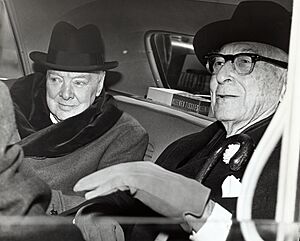
Winston Churchill, who was a famous British leader, and Baruch were good friends. Churchill sometimes stayed at Baruch's home in New York when he visited the United States.
Family
Baruch married Annie Griffin from New York. They had three children: Belle Baruch, Bernard Baruch Jr., and Renée Baruch. Their daughters were raised in the Episcopalian faith.
His daughter, Belle Baruch, loved sports and never married. His son, Bernard Baruch Jr., married Winifred Beatrice Mann, but they later divorced and had no children. His daughter Renee married Henry Robert Samstag, and they also had no children.
Hobcaw Barony Estate
Between 1905 and 1907, Baruch bought about 16,000 acres of land in Georgetown County, South Carolina. This land was once part of several old plantations. He turned parts of the property into a winter hunting retreat. Later, he sold the property to his oldest daughter, Belle.
When Belle passed away in 1964, the property became The Belle W. Baruch Foundation. It is now called the Hobcaw Barony educational and research preserve. The property includes 37 historic buildings that show what life was like in the 18th and 19th centuries, especially related to rice farming, and also how it was used as a resort in the early to mid-20th century. The entire property was recognized as a historic place in 1994.
Today, two universities, the University of South Carolina and Clemson University, use Hobcaw Barony for education and research. They study the wetlands, forests, and coastal areas. The Belle W. Baruch Foundation and the North Inlet-Winyah Bay National Estuarine Research Reserve also run a Discovery Center there, offering tours and special programs.
Honors and Recognitions
Bernard Baruch was a very important and wealthy man for about 50 years. He was a great investor, a public official, and a trusted advisor to presidents. His life shows how the American political system worked.
- Baruch College in New York City is named after him.
- The Saratoga Race Course named a horse race, the Bernard Baruch Handicap, in his honor.
- He received an honorary Doctor of Laws degree from Oglethorpe University in 1933.
- The Bernard M. Baruch Houses, a public housing development in New York City, are also named after him.
See also
- Continental, Arizona, a town started by Baruch's Intercontinental Rubber Company
 | Shirley Ann Jackson |
 | Garett Morgan |
 | J. Ernest Wilkins Jr. |
 | Elijah McCoy |


